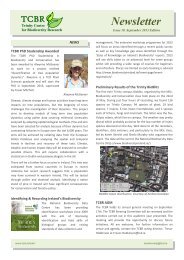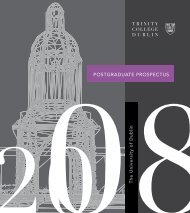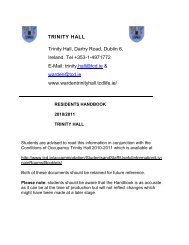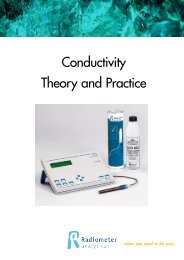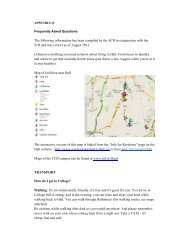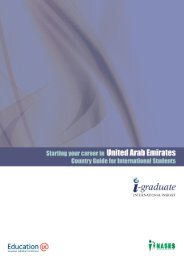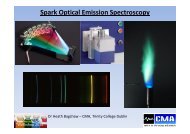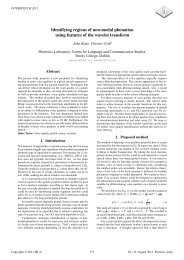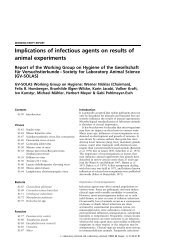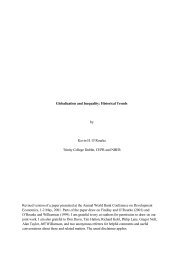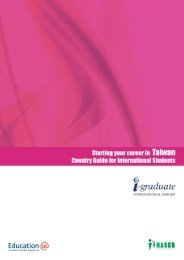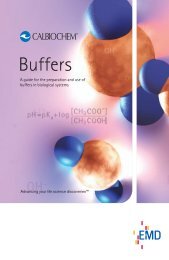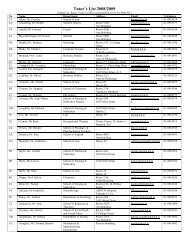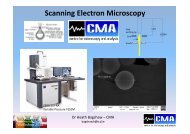Senior Freshman Programme 2013/2014 - Trinity College Dublin
Senior Freshman Programme 2013/2014 - Trinity College Dublin
Senior Freshman Programme 2013/2014 - Trinity College Dublin
You also want an ePaper? Increase the reach of your titles
YUMPU automatically turns print PDFs into web optimized ePapers that Google loves.
Geology<br />
<strong>Senior</strong> <strong>Freshman</strong> Geology courses all have GL1101 as a prerequisite.<br />
There are two modules, one in Michaelmas Term and one in Hilary Term.<br />
Module GL2205 in Michaelmas term is a prerequisite for the GL2206<br />
module in the Hilary Term. Taking both modules provides a coherent<br />
package of material relating to our planet.<br />
An optional short residential field course in Michaelmas term will visit the<br />
spectacular geology around the Giant’s Causeway in Antrim. Acceptance<br />
on this, which will have limited numbers, will be on a first come basis.<br />
Similarly a second optional residential field course in Hilary term to County<br />
Wexford will take place during part of the study week and an adjacent<br />
weekend. Attendance at these field courses is very strongly recommended<br />
for those students wishing to moderate in Geology.<br />
GL2205 The Dynamic Earth 1: rocks and evolution<br />
(Co-ordinator: Professor Balz Kamber: kamberbs@tcd.ie)<br />
10 credits<br />
The overall objective of the course is to illustrate the dynamic nature of<br />
planet Earth both from its rock and fossil record. The course initially<br />
approaches the solid materials that make up the outer parts of the Earth,<br />
the lithosphere, namely rocks and their basic building blocks, minerals. A<br />
pathway is taken through the rock cycle from initial formation from mantle<br />
material into igneous rocks, their subsequent breakdown at the Earth’s<br />
surface and reconstitution into sedimentary rocks and the alteration of<br />
these rocks through burial at elevated temperatures and pressures.<br />
Techniques of describing and reaching first stage interpretations of rocks<br />
and minerals in hand sample are covered.<br />
Equipped with an appreciation of the dynamic nature of the solid Earth,<br />
the course then introduces the time dimension to life, which has existed<br />
on planet Earth for much of its history. Fossil organisms are the data that<br />
record the evolution of life on the planet. In this course the aims are to<br />
provide (1) the means to identify a broad range of invertebrate and<br />
vertebrate fossils; (2) an understanding of form and function in fossil<br />
organisms and their links to living floras and faunas; (3) an overall<br />
appreciation of the evolutionary record of life on Earth.<br />
GL2205 Learning Outcome:<br />
On successful completion of the module students will be able to describe<br />
and identify common kinds of rock, and the minerals they contain, in hand<br />
sample. They will be able to trace the dynamic progression of Earth<br />
materials from one kind of rock to another in the context of plate tectonic<br />
settings. They will be able to describe and classify a broad range of<br />
organisms found in the fossil record, and to explain the concepts of<br />
fossilization, evolutionary sequences and lineages. They will be able to<br />
outline the uses of fossils in palaeobiological, palaeogeographic and<br />
evolutionary studies, and to state the basic principles of taxonomic<br />
procedure.<br />
22



